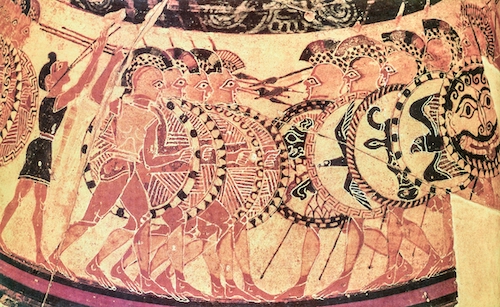(Photo: internet)
As long as there have been people in the world, there have been potentates like Putin, who dream of great powerful empires. Stealing countries is even older than Methusalem. There has however been only one country-conquering-king who was more known as an artful warlord than a mass murder: Alexander the Great.
In ancient times wars were completely different: they consisted of besieging cities and battles on sea and land, where soldiers fought against each other with clubs, spears and swords. Going to war was a matter of honour, heroes and gods, that is how the Trojan war is described. Nowadays nobody would dare to decorate plates or vases with tanks or trenches. The ancient Greeks they did picture war scenes on china, like the famous Chigi vase (from 650 BC), with images of Hoplite soldiers, weaponed civilians with spears and shields, standing in phalanx (closed formation with spears directed forwards).
The phalanx is one of the many stratagems invented by the Greeks that later was used by the Romans to enlarge their famous empire.Also development of larger boats, like the triremes, in which whole armies could work the oars, was important for Greek warfare.
Before the Roman empire stretched far over European frontiers, Greece, including Lesvos, was divided in city states. On Lesvos the first state was Mytilini, always fighting with the second state Methimna (Molyvos). In the novel Daphnes and Chloe by Longus fighting between two states consisted of no more than some kidnappings and cattle thefts. The reality was a bit rougher. Methimna invaded the state of Arisvi to destroy the city and later it took Andissa from some vengeful Romans.
During the Peloponnesian war, in 428 BC, Mytilini, along with Sparta and some other cities, wanted to revolt against the Athenian rulers. Methimna however refused to betray its ally Athens. Athens heard about the coming rebellion, and ended the revolution even before it started (Sparta having been unable to get aid to Mitilini in time). In Athens it was decided that Mytilini would be punished by the death of all its male citizen, its women and children sold as slaves.
In 81 BC was the Siege of Mytilini, when the city again – and in vain – wanted to revolt, this time against the Romans its rulers. The city also was suspected of working together with pirates. The Siege of Mytilini now famous because Julius Cesar was one of the Roman soldiers who put an end to the revolt, and who was awarded a ‘Civic Crow’, as reward for saving another Roman soldier.
Most of the imprisoned civilians were sold into slavery. Massacres were not common. There is however the sad story of Chios, where in 1822, during the Greek War of Liberation, rebels from Samos came to fight the Turkish rulers. But the swift arrival of Ottoman troops looted the city, put it on fire and had orders to kill. According to Wikipedia more than 52,000 civilians were killed, more than 52,000 taken into slavery, 21.000 were able to flee and only some 2000 people remained on the destroyed island. Two years later the French painter Eugène Delacroix made his famous painting The massacre of Chio, just as Picasso painted in 1937 his famous Guernica after the bombing of that little city during the Spanish civil war.
War is a popular theme in literature: soldiers, prosecutions, bombings and people in hiding; most of them sad stories about the cruelty of humans. Only the Trojan war left us with big heroes and myths that have surviving through history. They are glamorous books, containing some killings, but also heroes that stood, not for destroying the world, but by having honest fights.
Since the aerial bombardments were introduced in the First World War, wars seem to have become more lethal and grimmer. Now you only need one crazy person to destroy the whole world by pushing a simple button.
Back to Mytilini in 427 BC, whose citizen were condemned by the Athenian Assembly. This verdict however was rejected the next day by Diodotus, causing the now famous Mytilinian debate: based on humanity and strategy, you’d better spare your enemy in order to create an alliance. The messenger bringing this joyful news got into a trireme with a maximum of rowers and arrived just in time on Lesvos to prevent a bloody massacre (they only had started executing prisoners). So, in earlier times when all was better, even wars were better, because more humane. It is clear that Putin has nothing in common with the ancient, wise Greeks.











